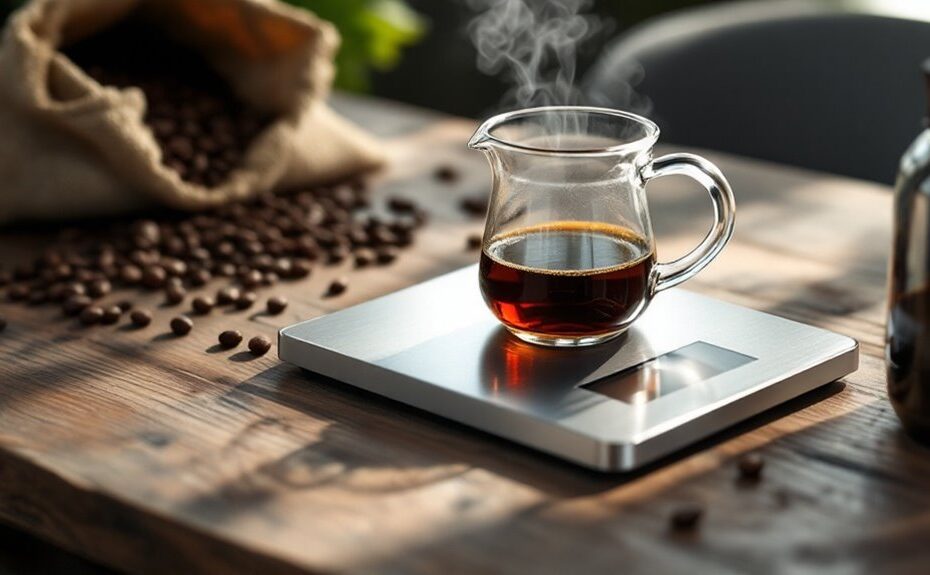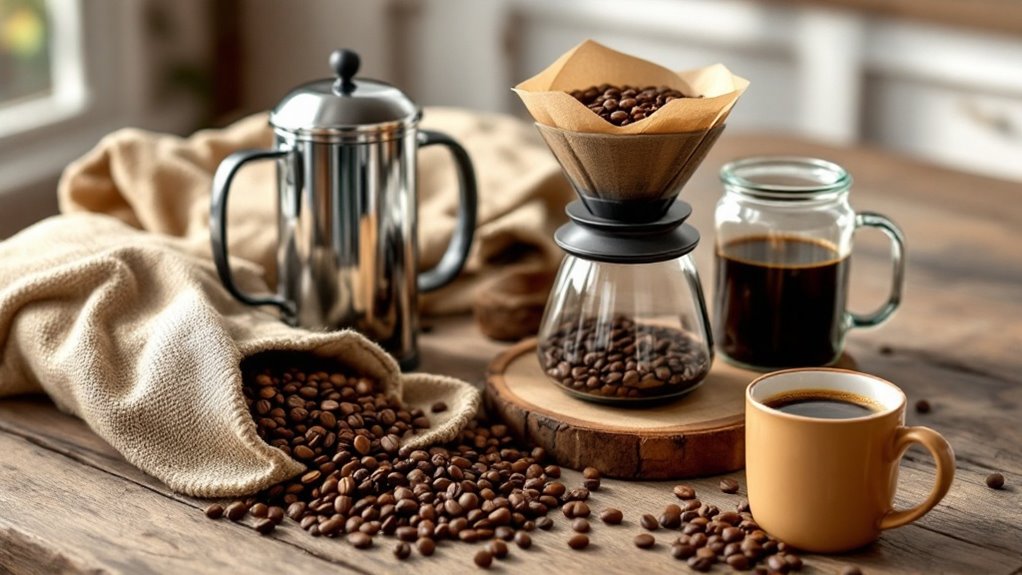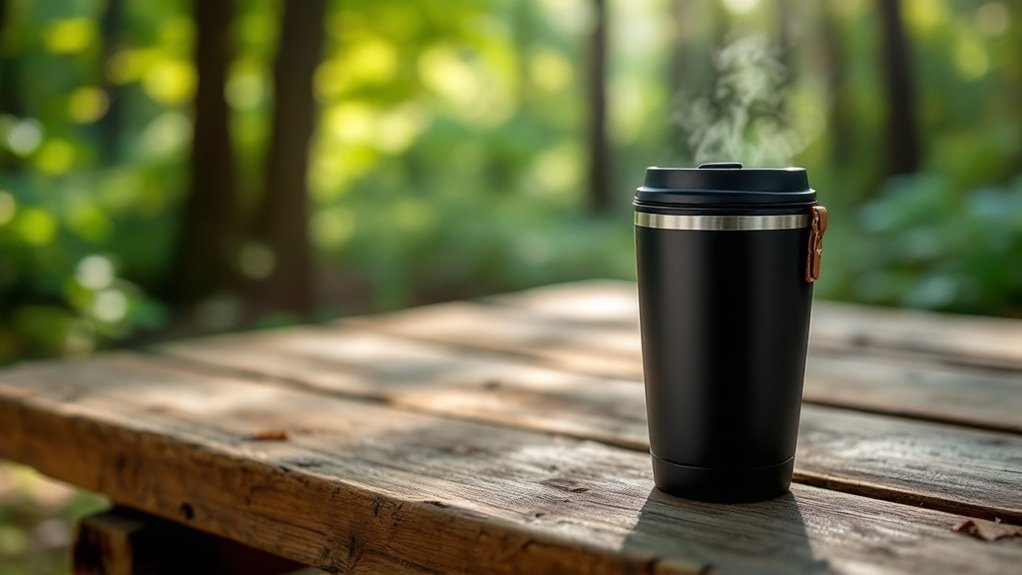







When you're aiming for the perfect cup of coffee, precision matters. A reliable coffee scale guarantees consistency, but with so many options available, choosing the best one can feel overwhelming. You'll need to evaluate accuracy, durability, and features like built-in timers or water resistance. Whether you're brewing pour-over or pulling espresso shots, the right scale can elevate your process. But how do you decide which model fits your needs—and your budget? The answer lies in understanding the subtle differences between scales and how they align with your brewing style. What makes one stand out above the rest? Let's explore.
Key Takeaways
- The Acaia Pearl S ($150) is ideal for precision brewing with seven modes, auto-start timers, and a Brewguide feature for coffee-to-water ratios.
- The Timemore Black Mirror Pro (under $75) offers accuracy for pour-over, French press, Aeropress, and espresso, with an auto-start timer for convenience.
- The Fellow Tally Precision Pro ($185) features brew-assist mode and a 1:16 coffee-to-water ratio dial, perfect for pour-over and French press brewing.
- The Acaia Lunar ($250) excels in espresso brewing with live flow rate measurement, auto-start timer, and Bluetooth connectivity for advanced tracking.
- The OXO BREW Precision Scale ($56) provides a large display, 3000-gram capacity, and reliability for both espresso and pour-over brewing methods.
Why Coffee Scales Are Essential
Coffee scales are indispensable tools for achieving precision in brewing, as they measure weight in tenth of a gram increments. When you're brewing espresso, even a 2-3 gram error can drastically alter the flavor profile, making accurate measurement critical. For pour-over methods, maintaining the correct coffee-to-water ratio guarantees consistent extraction, and scales provide the precision needed to achieve this balance. Without a scale, you're left guessing, which often leads to over- or under-extraction, resulting in a subpar cup.
Coffee scales also account for variations in coffee bean density, which volume-based scoops can't accurately measure. This guarantees you're using the exact weight of coffee required for your brewing process, whether it's espresso or pour-over. Additionally, scales with built-in timers and flow rate meters further enhance precision by helping you monitor extraction time and water flow, two variables that greatly impact flavor.
During longer brewing processes, scales remain active for up to 30 minutes without resetting, guaranteeing uninterrupted measurement. This reliability eliminates inconsistencies and allows you to focus on perfecting your technique. By incorporating a coffee scale into your routine, you'll achieve the precision necessary to elevate your brewing process and consistently produce exceptional coffee.
Key Features of a Coffee Scale
When selecting a coffee scale, prioritize precision in measurements, ensuring it offers increments as fine as 0.1 grams for accurate dosing. Look for essential brewing features like a built-in timer to monitor extraction time and a high weight capacity to handle larger brewing setups. Durable, water-resistant materials and optional features such as auto-tare or flow rate indicators can further refine your brewing process.
Precision in Measurements
Precision in measurements is the cornerstone of achieving consistent, high-quality coffee, and a reliable coffee scale is indispensable for this purpose. When measuring weight, a scale with a resolution of 0.1 grams guarantees accuracy, particularly for espresso, where even a 2-3 gram deviation can drastically alter flavor. High-resolution scales are especially critical for single-cup brewing, where small quantities of coffee demand exact measurements. Accurate coffee-to-water ratios, such as 1:16, rely on precise weight readings to achieve balanced extraction. A scale's ability to measure in grams with minimal error guarantees repeatability, a key factor in brewing consistency. Additionally, features like flow rate monitoring allow you to track water dispersion, further refining your brewing process. Auto-tare functions eliminate container weight, guaranteeing only the coffee and water are measured. By combining precise weight measurements with accurate coffee-to-water ratios, you can replicate ideal brewing conditions every time. A scale's resolution and accuracy directly impact the quality of your brew, making it essential to choose one that delivers reliable, repeatable results. Precision isn't just a feature—it's the foundation of exceptional coffee.
Essential Brewing Features
A reliable coffee scale isn't just a tool—it's your gateway to mastering the art of brewing. Precision is non-negotiable; look for a scale that measures in grams with increments as fine as 0.1 grams. This guarantees you can replicate recipes with exactitude, whether you're weighing coffee grounds or water. A built-in timer is equally critical, allowing you to monitor brew time for consistent extraction. Pair this with a high weight capacity—around 2000 grams—and you'll handle everything from single cups to larger brewing setups. Durability matters too; opt for scales made from robust materials like aluminum and featuring water-resistant designs to withstand spills and daily wear. Clear OLED displays enhance readability, even in low light, while USB-C charging guarantees quick, modern power delivery. These features combine to create a scale that's not only precise but also practical and long-lasting, making it an indispensable tool for any serious coffee enthusiast.
Differences Between Pour-Over and Espresso Scales
Espresso scales require compact platforms to fit under portafilters, while pour-over scales need larger surfaces to support brewing vessels like Chemex. Display positioning differs considerably, with pour-over scales often featuring offset or separated displays for visibility during brewing, whereas espresso scales prioritize minimalistic designs for tight spaces. Feature compatibility also varies, as espresso scales integrate flow rate meters and portafilter settings, while pour-over scales focus on stability and capacity for larger doses.
Platform Size Requirements
When choosing a coffee scale, the platform size is a critical factor that directly impacts its functionality for specific brewing methods. For espresso scales, the platform size must accommodate portafilters, requiring a compact design typically around 6.3 x 6.3 inches. These scales often feature a low profile to fit under espresso machines, guaranteeing accurate measurements without interfering with the brewing process. In contrast, pour-over scales demand a larger platform size, often 5.5 x 7.5 inches or more, to support brewing vessels like Chemex or carafes. A flat, stable surface is essential to prevent spills and maintain precision during the pour. Some scales, like the Acaia Pearl, offer an adjustable platform, making them versatile for both espresso and pour-over setups. However, if you primarily brew espresso, prioritize a scale with a platform that fits snugly under your portafilter. For pour-over enthusiasts, confirm the platform size can comfortably hold your brewing vessel while providing a stable surface for consistent measurements. Always consider your primary brewing method to select a scale with the most suitable platform size for your needs.
Display Positioning Needs
Considering the constraints of brewing environments, display positioning on coffee scales must align with the specific demands of your brew method. For an espresso scale, the display is often offset or front-facing to guarantee readability in tight spaces under portafilters, where height clearance is limited to 1-2 inches. This design prevents obstruction from the machine while allowing you to monitor weight and time without straining. In contrast, a pour-over scale typically features a centered or elevated display to remain visible when larger brewing vessels, like a Chemex or V60 dripper, are placed on the platform. The display must be positioned to avoid being blocked by the vessel's base, confirming you can track measurements during the pour-over process. Some advanced models, such as the Acaia Pearl, offer adjustable display orientations, making them versatile for both espresso and pour-over setups. When choosing a coffee scale, prioritize display positioning that complements your brewing style and vessel size, as this directly impacts usability and readability during critical brewing moments.
Feature Compatibility Differences
Feature compatibility between pour-over and espresso scales hinges on their distinct design priorities and brewing requirements. Espresso scales are built to fit under portafilters, requiring low profiles and specific spacing, while pour-over scales feature larger platforms to support brewing vessels like Chemex or V60. Espresso scales often include a flow meter to monitor extraction rates and portafilter-specific settings, guaranteeing precision in small weight increments (0.1 grams). In contrast, pour-over scales prioritize larger capacities for measuring water and coffee, along with offset or separated displays for better readability during brewing.
Auto-start timers on espresso scales activate with weight changes, syncing with your shot preparation, while pour-over scales may offer guided brew settings for step-by-step brew recipes. Espresso scales are less versatile, often requiring pre-measurement checks to guarantee compatibility with your machine. Pour-over scales, however, adapt to multiple brewing methods, making them more flexible. If you're focused on weight and time for espresso, choose a scale with advanced flow rate tracking. For pour-over, prioritize features like guided brew modes and larger platforms to streamline your process. Matching these features to your brewing method guarantees peak performance.
Top Coffee Scales for Precision Brewing
Precision brewing demands tools that deliver accuracy and functionality, and the right coffee scale can make all the difference. For pour-over and espresso enthusiasts, the Acaia Pearl S stands out with its seven brewing modes, including auto-start timers and a Brewguide feature for step-by-step instructions. At $150, it's a versatile choice for mastering the coffee-to-water ratio. The Timemore Black Mirror Pro, priced under $75, excels in accuracy for pour-over, French press, Aeropress, and espresso, featuring a dedicated on-off switch and auto-start timer. If you prioritize brew-assist mode and precise ratios, the Fellow Tally Precision Pro, at $185, offers a 1:16 coffee-to-water ratio dial, ideal for pour-over and French press. For espresso-specific needs, the Acaia Lunar, priced at $250, includes live flow rate measurement, auto-start timer, and Bluetooth connectivity, though its interface can be challenging. Budget-conscious brewers will appreciate the OXO BREW Precision Scale at $56, with a large display and 3000-gram capacity, making it reliable for both espresso and pour-over. Each scale caters to specific precision brewing needs, ensuring you achieve consistent results.
Best Coffee Scale for Pour-Over
When brewing pour-over coffee, choosing the right scale can elevate your technique by guaranteeing consistent measurements and precise control over your coffee-to-water ratio. The Acaia Pearl S is a standout choice, offering a large weighing platform, seven brewing modes, and a Brewguide feature for step-by-step instructions. Its offset display secures readability during brewing, enhancing your workflow. For a dedicated pour-over experience, the Fellow Tally Precision Pro excels with its large circular platform and brew-assist mode, which includes a 1:16 coffee-to-water ratio dial for precision. If you're on a budget, the Timemore Black Mirror Pro delivers accurate measurements under $75, making it versatile for pour-over, French press, and Aeropress brewing. For larger vessels like the Chemex, the Hario V60 Drip Coffee Scale is ideal, featuring a built-in timer and a design tailored for pour-over brewing. Each of these scales prioritizes accuracy, readability, and functionality, securing you achieve the perfect extraction every time. Whether you're a beginner or a seasoned barista, investing in a high-quality scale like these will refine your pour-over brewing process.
Best Coffee Scale for Espresso
Achieving the perfect espresso shot demands meticulous attention to detail, and a high-quality scale is essential for mastering this craft. For espresso, you need a scale that fits under portafilters, offers precise measurements, and includes features like flow rate tracking. The Acaia Lunar excels here, with its live flow rate measurement, auto-start timer, and Bluetooth connectivity to the Acaia Coffee app. Its compact design guarantees compatibility with most espresso machines, though its $250 price tag reflects its premium features. The Timemore Black Mirror Pro is another excellent choice, offering a sleek, low-profile design that fits seamlessly under portafilters. It's more affordable than the Lunar but still delivers precision and durability. The OXO BREW Precision Scale is a budget-friendly option, providing a 3000-gram capacity and a straightforward display, though it lacks advanced features like flow rate tracking. Avoid the Fellow Tally Precision Pro for espresso, as its design isn't compatible with most espresso machines. When selecting a scale, prioritize compactness, precision, and features tailored to espresso brewing.
Best Budget-Friendly Coffee Scale
For those seeking a reliable coffee scale without breaking the bank, budget-friendly options deliver the core functionality needed for consistent brewing. The Hario V60, priced at $40, is a solid affordable choice for home baristas, featuring a built-in timer and a classic design. However, it lacks espresso compatibility, making it better suited for pour-over methods like its namesake. If you need 0.1-gram precision and a compact design, the Timemore Basic Mini at $60 is a standout option. It includes a built-in timer and offers the accuracy required for precise measurements, whether you're brewing espresso or pour-over. While it's slightly pricier than the Hario V60, its enhanced features justify the cost for those prioritizing precision. Both scales focus on essential features, omitting advanced extras to keep costs low. If you're a cost-conscious home barista, these budget-friendly scales provide the accuracy and functionality you need without compromising on quality. Whether you choose the Hario V60 for its simplicity or the Timemore Basic Mini for its precision, both are excellent affordable choices for consistent brewing.
How We Tested Coffee Scales
To guarantee the coffee scales we recommend meet the highest standards, we conducted a rigorous testing process focused on accuracy, responsiveness, and usability. We began by measuring accuracy using calibration weights ranging from 1g to 100g, verifying each scale delivered precise readings essential for coffee brewing. Responsiveness and consistency were evaluated by timing 10-bean weight readings, examining how quickly and reliably each scale updated measurements. Practical brewing tests, including pour-over and espresso, were performed to evaluate usability, display readability, and compatibility with brewing equipment. We also tested additional features like timers, flow rate meters, and guided brew settings to determine their functionality and ease of use during brewing. Durability and heat resistance were analyzed by exposing scales to hot water and spills, simulating real-world conditions to confirm long-term performance. Each scale's ability to withstand heat and maintain accuracy under stress was critical for consistent results. By combining technical precision with real-world brewing scenarios, we confirmed the scales we recommend excel in both performance and practicality.
What to Look for in a Coffee Scale
When selecting a coffee scale, precision and functionality are non-negotiable for achieving consistent, high-quality brews. Look for a scale with a precision of 0.1 grams to guarantee accurate measurements, as even minor discrepancies can impact your brew. A built-in timer is essential for tracking extraction time, allowing you to replicate successful recipes with ease. Make certain the scale has a maximum weight capacity of at least 2000 grams to handle larger brewing vessels or multiple components. A clear OLED display is vital for readability, especially in low-light conditions, while USB-C charging offers modern convenience and faster power replenishment. Durability is key, so opt for scales made from robust materials like aluminum, which resist wear and tear from spills or accidental drops. These features combine to create a reliable tool that enhances your brewing process, maintaining consistency and precision in every cup. Prioritize these elements to find a coffee scale that meets your needs and elevates your coffee-making experience.
Disclosure: As an Amazon Associate, I earn from qualifying purchases.






